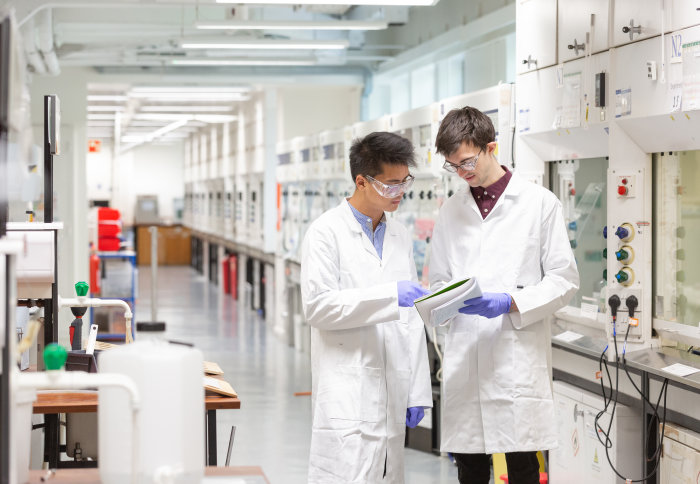From clean meat to secrets of the microbiome: students tackle global challenges

Undergraduate students are tackling some of society’s biggest challenges as part of the Faculty of Natural Sciences Make-A-Difference competition.
The competition tasks three teams of undergraduate students with developing low-cost technology solutions which will have an impact on society. From tackling battery recycling to using the gut microbiome to predict disease, this year’s participants are spending eight weeks turning their ideas into proof-of-concept prototypes.
Each team has been given lab-space, funding, and guidance from academic mentors as they compete for prizes of up to £6000. The teams will pitch their ideas at the final stage of the competition on 23 October 2019.
Clean meat
Multus Media, made up of Cai Linton (Bioengineering), Evan Whooley (Life Sciences), Kevin Pan (Life Sciences) and Réka Trón (Life Sciences), are creating an enabling technology for the clean meat industry. By growing meat produce in bioreactors instead of using animals, the clean meat industry is creating a sustainable way to produce meat that eliminates much of the adverse environmental effects of conventional meat production.

The team is addressing one of the main barriers preventing this industry being economically viable – the growth medium used to nourish and grow the cells. While cultured meat has been around for a number of years, it is usually very expensive.
Their animal-free culture medium, is based on genetically engineered yeast that produces mammalian cell growth factors – a substance, such as a vitamin or hormone, which is required for the stimulation of growth in living cells. The team’s aim with the project is to bring down the cost of cultured meat.

Cai said: “Being part of FoNS-MAD is an opportunity to accelerate our work, by giving us access to more specialised lab facilities, academic mentorship and funding.” The team’s next steps are to develop a proof of concept, then they hope to scale up and collaborate with clean meat companies.
Gut feeling
GutFeeling – which includes Carla Smith (Life Sciences), Soumya Sharma (Medical Biosciences), Tamas Dobai (Life Sciences) and Codin Pacuraru (Computing) – are building computational models to explore the link between the gut microbiome and diseases like Parkinson’s to aid the diagnosis.

The gut microbiome, the name given to the microbe population living in our gut, is increasingly researched as being linked to various diseases, however the team say that as of yet, no one has combined existing studies and produced a software to measure the link with diseases.
As part of their computational project, they are using machine learning to detect patterns in healthy people and patients with Parkinson's disease, with the aim of ultimately using this as a diagnostic tool.
Soumya said: “The competition is central to progressing our project. We’re given so much independence and it is exciting to investigate the revolutionary potential of this field.”
Carla added: “In the future, we hope to apply our framework to other diseases that may be linked to the gut microbiome.”

Battery recycling
Team Re-CoLi, made up of chemistry students Karl-Ander Kasuk, Jireh Chiu, Gatsby Fitzgerald and Conor Crooks, are focusing on recycling lithium ion batteries, a type of rechargeable battery commonly used for portable electronics and electric vehicles.
The team say that currently only a small percentage of lithium ion batteries are currently recycled, with the processes being harmful to the environment and costly. This is a problem they see as being key to address, especially due to electric cars – which rely on the batteries – becoming increasingly popular.
In particular, the team are trying to find the best conditions for extracting the negative end of the battery, known as the cathode.
Gatsby said: “We are enjoying being able to use new techniques and analysis methods, and have the independence to design experiments and conduct research.”

Societal impact
The aim of the FoNS-Make-a-Difference competition is to provide undergraduate students with a forum to develop low-cost technology that would have an impact in society. In the process, they will also develop new skills which will enhance their CV and have the opportunity to take part in workshops on intellectual property, business ethics and team building.
The competition is open to all undergraduate students from the Faculty of Natural Sciences and to team members from other Faculties.
The main feature of the competition is the opportunity for finalist teams to undertake an 8 week funded lab placement over the summer, where they will have the chance to develop their idea to proof of concept stage.
Article text (excluding photos or graphics) © Imperial College London.
Photos and graphics subject to third party copyright used with permission or © Imperial College London.
Reporter
Thomas Angus [Photographer]
Communications Division
Joanna Wilson
Communications Division